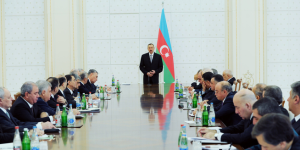
President Ilham Aliev addressing a meeting of the cabinet of Ministers in Baku on 15 January 2013.
Azerbaijan has become the latest country to shed off its “post-soviet label”. The term long frowned upon by the Baltic states and Georgia amongst others, is often used to describe those countries that emerged from the collapse of the USSR in 1991.
Azerbaijani President Ilham Aliev, who later this year will seek re-election for the third term, told a meeting of the Cabinet of Ministers that Azerbaijan had made great achievements in the economic field and in the sphere of international diplomacy. the President said that next month the country will also launch its first telecommunications satellite into orbit. Aliev said, “ Azerbaijan is becoming a space-faring nation, we are developing a space industry. a few years ago it was hard to imagine that there would come a time when Azerbaijan would become a space-faring nation. But that time is coming, and in the next few days we will celebrate this historic event. this, in itself, is a great achievement in every sense – for the prestige of the country, for its modernization and for the development of new technologies. It is also beneficial for business, because it is an economically viable project.
But most importantly, it demonstrates the development and intentions of our country. It demonstrates our overall outlook and policy because we are building a modern and strong state. We have long gone beyond regional boundaries. We have long left in the past the notion of a post-Soviet country. We are not a post-Soviet country. Sometimes in meetings with foreign partners the phrase “post-Soviet country” is used. I say to them, “Wait. Azerbaijan is not a post-Soviet country. Perhaps some countries are post-Soviet, but we are not. We are the independent state of Azerbaijan.” More…




